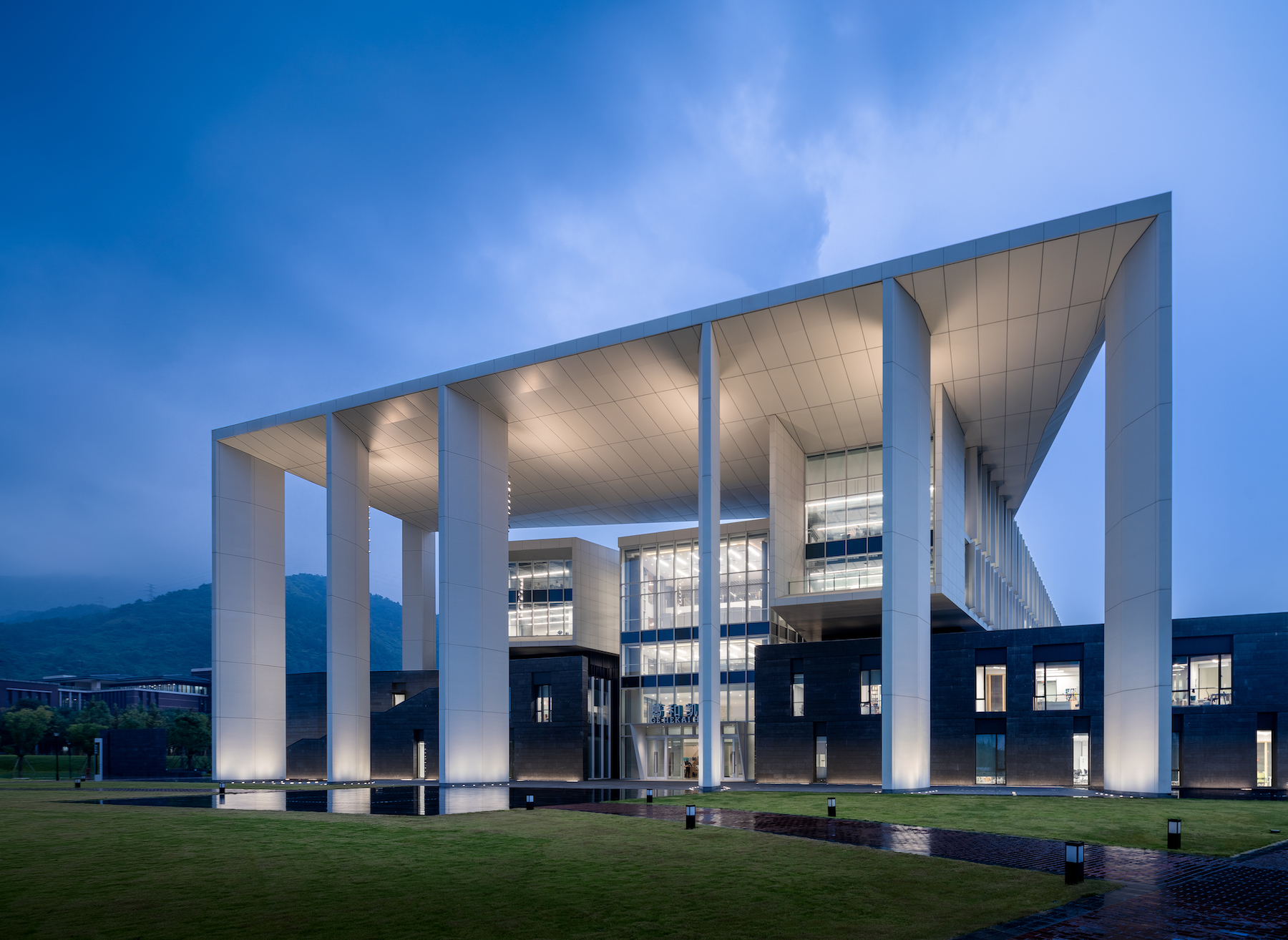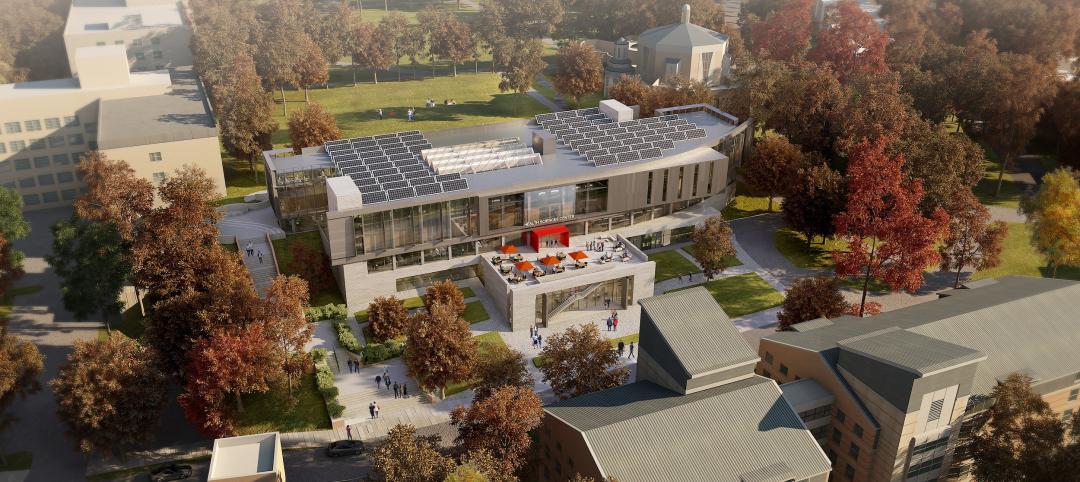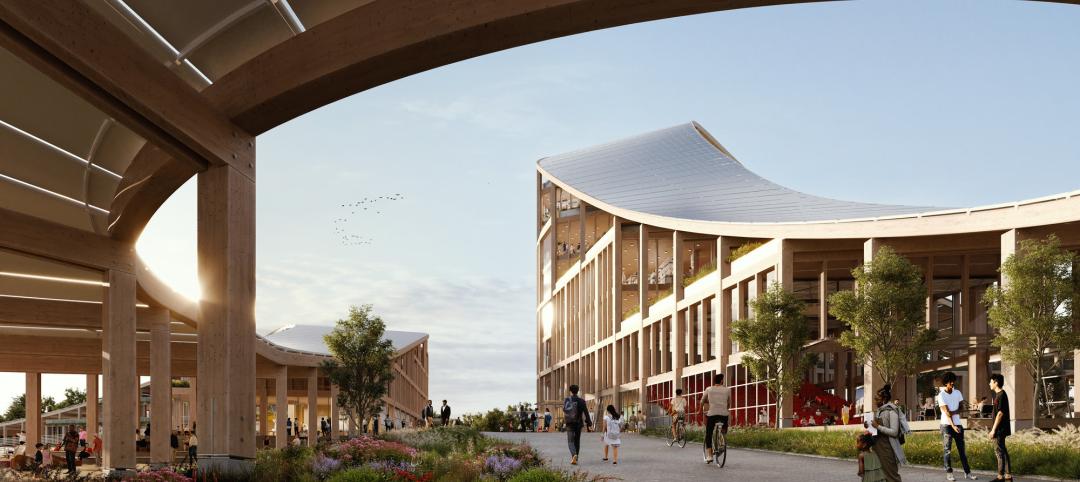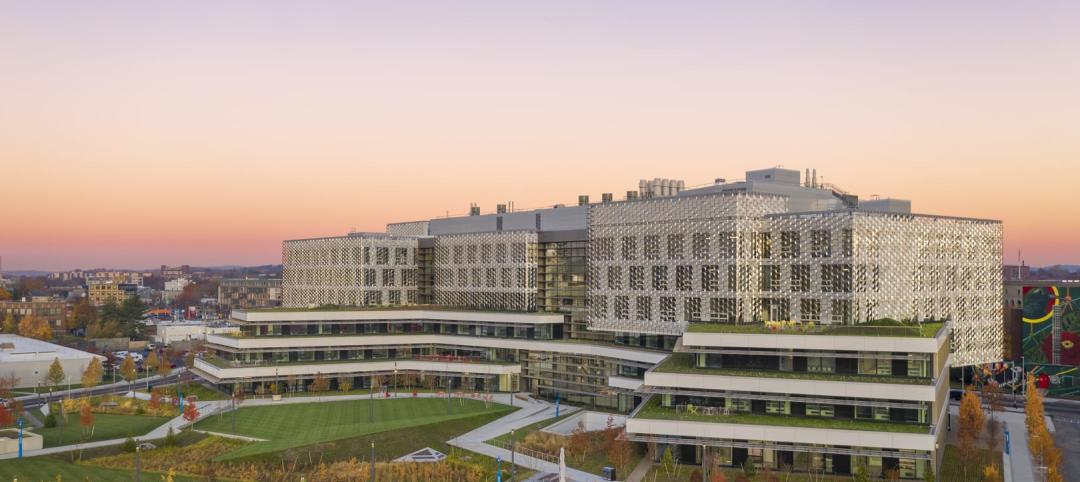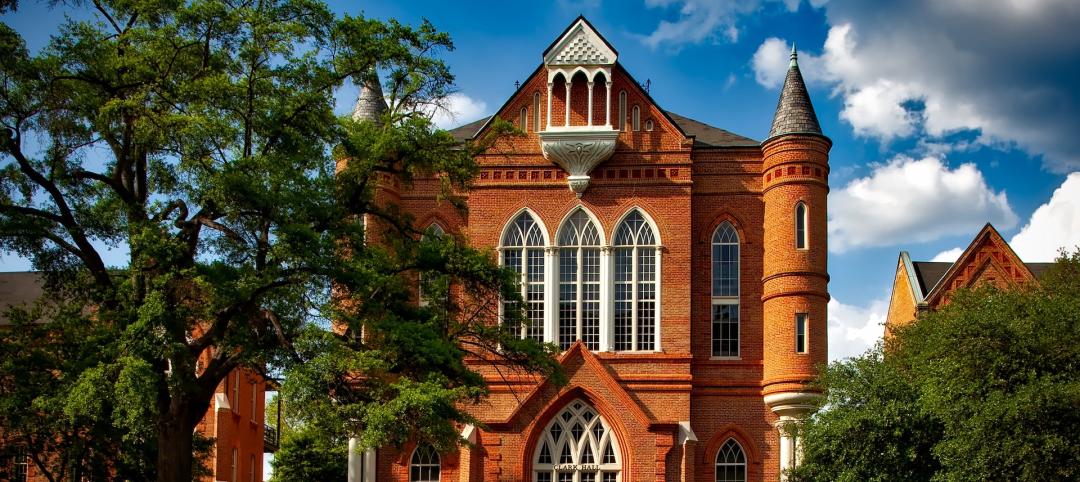After pandemic-related stops and starts, Wenzhou-Kean University’s Ge Hekai Hall has finally begun to see full occupancy. Located in Wenzhou, China, about five hours south of Shanghai, Ge Hekai Hall serves as the front door to the university’s 175-acre campus. Designed by Moore Ruble Yudell, Ge Hekai Hall houses three schools, including architecture and design, for Wenzhou-Kean University, a joint venture between New Jersey’s Kean University and China’s Wenzhou University.
Ge Hekai Hall’s gateway portico nods to both the surrounding mountain landscape and the high-rise residential towers across the street. The structure comprises eight buildings that contain classrooms, offices, shops, and a library. Evoking traditional Chinese alleyway neighborhoods, the alleys between the buildings provide light and air, multiple entries, and spaces for informal interaction. Accessible 24/7, the building’s rooftops are connected by a network of bridges. Atop these linear buildings sit two high-bay studio loft buildings.
“The building design concept revolves around sets of dualities: China’s past and future, building techniques old and new, and a set of orthogonal lower buildings supporting an active, angular upper building,” Christopher Chan, AIA, principal-in-charge of the project at Moore Ruble Yudell, said in a statement.
At the intersection of the lower and upper buildings, a civic-scaled atrium called the Forum serves as a community and social hub, an extension of the classrooms, and an 800-person event venue for the entire university.
Designed to LEED Gold and China Two-Star standards, the building integrates facade sunshades, a photovoltaic array, rainwater harvesting, thermal massing with a heat recovery system, and a passively cooled atrium. To enhance wellness, the design provides ample indirect sunlight and biophilic elements, such as over 2,000 square meters of solid wood. In addition, the building provides only the code minimum number of elevators, encouraging people to use the stairs in the Forum atrium.
On the Building Team:
Owner: Wenzhou-Kean University
Design architect, interior design, and landscape design: Moore Ruble Yudell Architects & Planners
Associate architect: Tongji University Architecture Design Research Institute
Architect of record: Zhongtian Construction Architectural Design Institute
Structural, civil, and MEP engineer: Zhongtian Construction Group Company Limited
Building and atrium lighting designer: Brandston Partnership Incorporated (BPI)
General contractor: Zhongtian Construction Group Company Limited
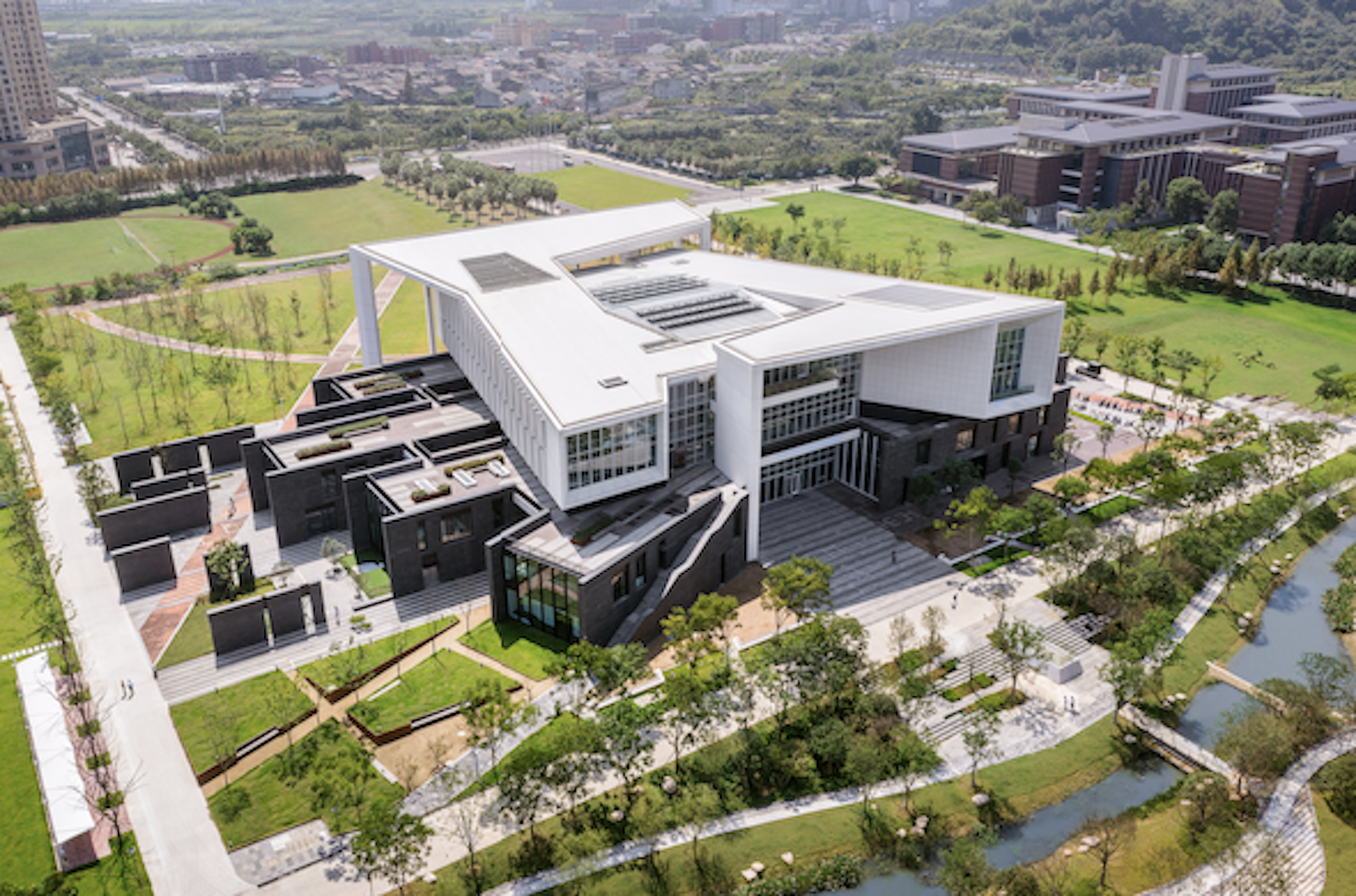
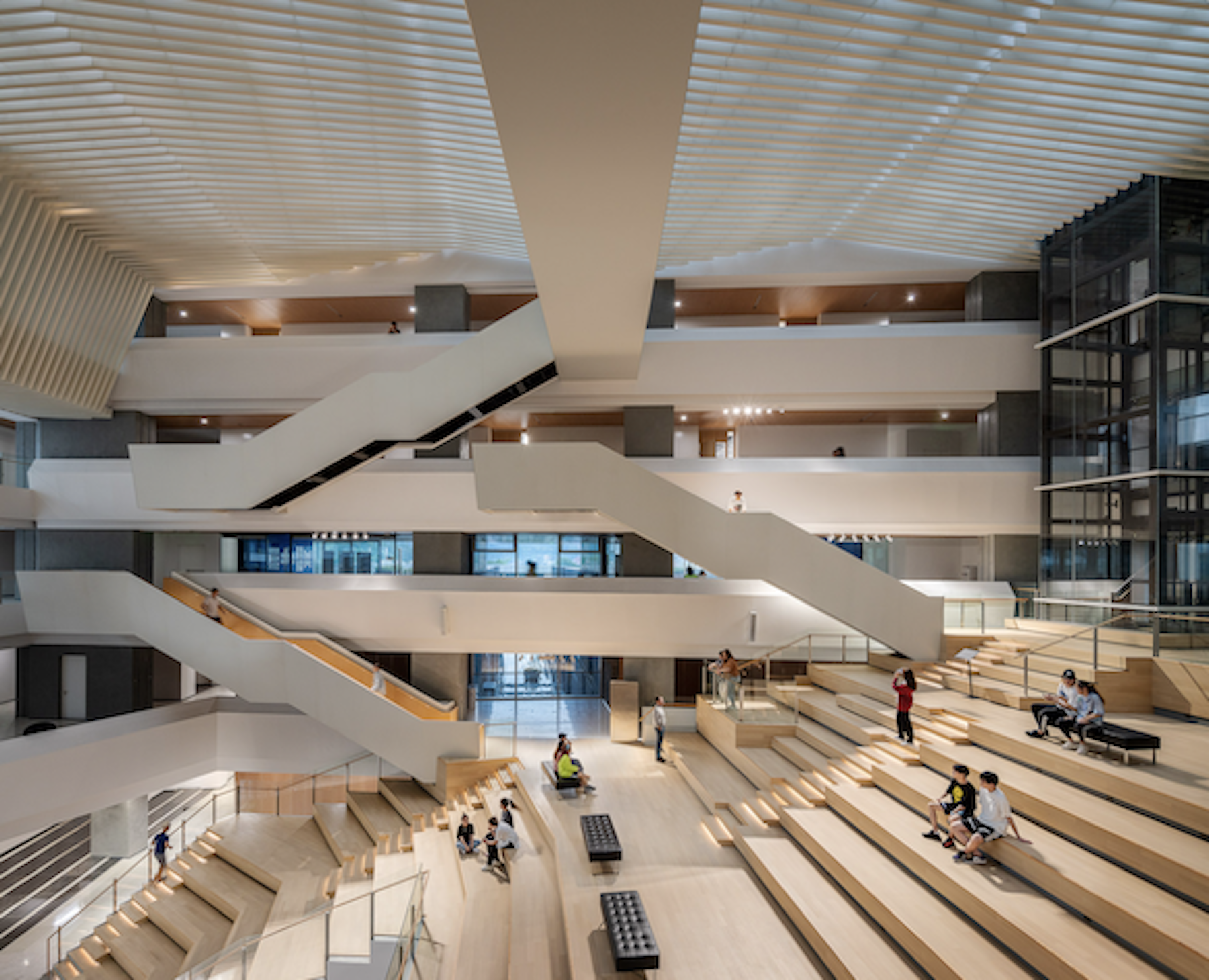
Related Stories
University Buildings | May 5, 2023
New health sciences center at St. John’s University will feature geothermal heating, cooling
The recently topped off St. Vincent Health Sciences Center at St. John’s University in New York City will feature impressive green features including geothermal heating and cooling along with an array of rooftop solar panels. The geothermal field consists of 66 wells drilled 499 feet below ground which will help to heat and cool the 70,000 sf structure.
Mass Timber | May 1, 2023
SOM designs mass timber climate solutions center on Governors Island, anchored by Stony Brook University
Governors Island in New York Harbor will be home to a new climate-solutions center called The New York Climate Exchange. Designed by Skidmore, Owings & Merrill (SOM), The Exchange will develop and deploy solutions to the global climate crisis while also acting as a regional hub for the green economy. New York’s Stony Brook University will serve as the center’s anchor institution.
University Buildings | Apr 24, 2023
Solving complicated research questions in interdisciplinary facilities
University and life science project owners should consider the value of more collaborative building methods, close collaboration with end users, and the benefits of partners who can leverage sector-specific knowledge to their advantage.
Green | Apr 21, 2023
Top 10 green building projects for 2023
The Harvard University Science and Engineering Complex in Boston and the Westwood Hills Nature Center in St. Louis are among the AIA COTE Top Ten Awards honorees for 2023.
Higher Education | Apr 13, 2023
Higher education construction costs for 2023
Fresh data from Gordian breaks down the average cost per square foot for a two-story college classroom building across 10 U.S. cities.
Market Data | Apr 11, 2023
Construction crane count reaches all-time high in Q1 2023
Toronto, Seattle, Los Angeles, and Denver top the list of U.S/Canadian cities with the greatest number of fixed cranes on construction sites, according to Rider Levett Bucknall's RLB Crane Index for North America for Q1 2023.
University Buildings | Apr 11, 2023
Supersizing higher education: Tracking the rise of mega buildings on university campuses
Mega buildings on higher education campuses aren’t unusual. But what has been different lately is the sheer number of supersized projects that have been in the works over the last 12–15 months.
Contractors | Apr 10, 2023
What makes prefabrication work? Factors every construction project should consider
There are many factors requiring careful consideration when determining whether a project is a good fit for prefabrication. JE Dunn’s Brian Burkett breaks down the most important considerations.
Smart Buildings | Apr 7, 2023
Carnegie Mellon University's research on advanced building sensors provokes heated controversy
A research project to test next-generation building sensors at Carnegie Mellon University provoked intense debate over the privacy implications of widespread deployment of the devices in a new 90,000-sf building. The light-switch-size devices, capable of measuring 12 types of data including motion and sound, were mounted in more than 300 locations throughout the building.
Architects | Apr 6, 2023
New tool from Perkins&Will will make public health data more accessible to designers and architects
Called PRECEDE, the dashboard is an open-source tool developed by Perkins&Will that draws on federal data to identify and assess community health priorities within the U.S. by location. The firm was recently awarded a $30,000 ASID Foundation Grant to enhance the tool.


